|
|
|
Sort Order |
|
|
|
Items / Page
|
|
|
|
|
|
|
| Srl | Item |
| 1 |
ID:
174560


|
|
|
|
|
| Summary/Abstract |
The United Nations Convention on the Rights of the Child entered into force in 1990. It condemns child marriage, violence and discrimination against children and enjoins tutelage for their education and health. Implementing such principles in national legislation sometimes conflicts with local norms relating to respect for cultural and religious traditions. This was the case of Trinidad and Tobago, a multicultural and multi-religious society that legally sanctioned child marriage until 2017. The paper makes two unique contributions to the literature. First, using the literature on child marriage and the obligations under international conventions, the paper creates a child marriage conceptual framework with the main normative positions on child marriage. Second, using the framework, it explores the normative motivations underlying the domestic legal reform debates held in parliament between 2015–2017. The paper uses the conceptual framework to explain the transformations in the traditional positions of local religious and ethnic groups, provides evidence of norm penetration from the international to a local multicultural setting and furthers the literature on international human rights norm penetration and contestation.
|
|
|
|
|
|
|
|
|
|
|
|
|
|
|
|
| 2 |
ID:
174563
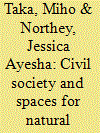

|
|
|
|
|
| Summary/Abstract |
In the Kenyan context of new resource discoveries and an ambitious devolution programme, and what is argued to be a shrinking of civic space globally, the role of civil society organisations (CSOs) working on natural resource governance is critical. The resilience, space and capacity of civil society to engage in the policy process, from community-based organisations to national non-governmental organisations, all shape outcomes in terms of legislation, policy and management of scarce resources. Drawing on interviews with CSOs from across Kenya, following the new 2010 constitution and devolution programme, this article explores how new negotiated spaces of participation around resource governance have emerged in Kenya. Using multidimensional frameworks to analyse power relations, it explores how Kenyan CSOs are cautiously redefining roles, offering expertise when devolved governments struggle, and standing up to powerful interests of corporate lobbies with varying degrees of success.
|
|
|
|
|
|
|
|
|
|
|
|
|
|
|
|
| 3 |
ID:
174557
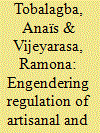

|
|
|
|
|
| Summary/Abstract |
This article argues that adopting a gender perspective when regulating artisanal and small-scale mining (ASM) is both necessary and achievable. The authors analyse women’s often-ignored needs and experiences as workers, decision-makers and affected community members in the ASM sector. To address these concerns, this article sets out standards for regulating ASM to guarantee women’s access to services and information and women’s decision-making and representation; to address the specific risks women face in the sector; and to provide access to effective remedies. The authors use international instruments to identify good practice benchmarks from which legislators and policymakers can draw. The article also notes where global norms fall short of addressing women’s rights in ASM. Some of the limitations of this approach are also acknowledged, notably the challenge of establishing gender-responsive laws that can be feasibly and effectively implemented. Nonetheless, the proposed approach should be favoured to better respond to the highly masculinised nature of the sector and the differentiated impacts of ASM on men and women while recognising women’s roles as beneficiaries and productive agents of the sector.
|
|
|
|
|
|
|
|
|
|
|
|
|
|
|
|
| 4 |
ID:
174562
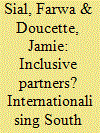

|
|
|
|
|
| Summary/Abstract |
In recent years, non-traditional or ‘emerging’ donors such as South Korea have organised their development cooperation models in a manner that seeks to complement the capacities of the private sector by extending the overseas activities of domestic businesses. To better understand this process, this article examines the role of South Korea’s large, family-led conglomerates (chaebol) in its growing international development sector. In particular, we focus on how the concept of corporate social responsibility (CSR) has been used to link the role of its large, and frequently scandal-ridden, private companies to international development, and, by extension, how it has helped to internationalise state–business networks long associated with the Korean developmental state. We examine two strategies through which this has been carried out. The first is by extending the logic of creating shared value (CSV, a derivative of CSR) to aid and infrastructure projects in which chaebol and other state-linked businesses have participated. The second is by directly embedding CSR-based aid initiatives in the value chains of the specific chaebol themselves.
|
|
|
|
|
|
|
|
|
|
|
|
|
|
|
|
| 5 |
ID:
174558
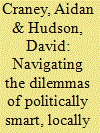

|
|
|
|
|
| Summary/Abstract |
Iterative approaches to development under banners such as ‘thinking and working politically’ and ‘doing development differently’ build upon decades-old commitments to fostering locally led and -owned development. These approaches are increasingly popular with academics and development practitioners. In this paper we argue that outsiders seeking to deliver locally led, politically smart programmes need to either accept that competing priorities, results and values will work to limit the extent of true local ownership, or be sufficiently committed to true local leadership to accept that this may well cut against organisational imperatives. Using the example of the Pacific-based Green Growth Leaders’ Coalition, we discuss how politically tricky partnerships challenge tenets of local leadership and ownership.
|
|
|
|
|
|
|
|
|
|
|
|
|
|
|
|
| 6 |
ID:
174561
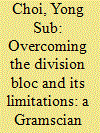

|
|
|
|
|
| Summary/Abstract |
Colonialism affects post-colonial social formations in a variety of ways. Japanese colonial rule had a far-reaching influence on South Korean post-colonial social formation. Most legacies of colonialism diminished as time went by, but one legacy of colonialism continued or even increased its effects on the South Korean political economy from the 1960s – namely, the division of Korea. This article provides an alternative Gramscian approach to the analysis of the social formation of South Korea, with due consideration of the division of the peninsula. For that purpose, it introduces the concept of a division bloc, adapting Gramsci’s concept of a historical bloc to develop an analysis of a social formation that is unique to South Korea. Then, I explicate the two events that have been most damaging for the division bloc – the 1997 economic crisis and the 1998–2007 inter-Korean reconciliation – describing them as an organic crisis and a hegemonic project, respectively. Following this, I present reasons why the counter-hegemonic efforts of liberal nationalists to overcome the division bloc failed.
|
|
|
|
|
|
|
|
|
|
|
|
|
|
|
|
| 7 |
ID:
174564
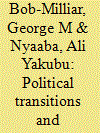

|
|
|
|
|
| Summary/Abstract |
What role does a commission of inquiry (COI) play in delivering accountability? In theory, when the public delegates power to political leaders to formulate and implement policies, they seek political accountability in return. Using Ghana as a case study, this study examines how the operations of COIs may deliver accountability. Principal–agent theories of accountability and African conceptions of legitimacy are incomplete on their own and need to be integrated into an explanation of political accountability that takes into consideration political transitions and the role of COIs in delivering a minimalist form of accountability. This study argues that a COI is an instrument of regime legitimatisation. The demands by citizens for political accountability in Ghana correlate with political transitions. Accompanying each power alternation was a different model of political accountability. To understand the predominant applications of accountability, we emphasise the politicisation of accountability.
|
|
|
|
|
|
|
|
|
|
|
|
|
|
|
|
| 8 |
ID:
174559
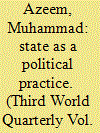

|
|
|
|
|
| Summary/Abstract |
The emphasis since the 1990s in the neoliberal paradigm on the non-interventionist state, and the theoretical disinterest in the state by critical scholarship, has negatively affected the prospects for political and social change. The fragmented and dispersed social movements analysed by critical scholars have proven insufficiently counter-hegemonic. All this invites us to reconsider the postcolonial state at a new theoretical level to guide better choices for political practice. This article analyses the prevalent academic literature on the postcolonial Pakistani state. In these analyses, an omnipresent and omnipotent military state decides the fate of democracy, now and again replacing politicians at the helm and also promoting Islam. Political practice remains confined to inter-elite struggles for the restoration of democracy, whereas imperialist hegemony and the role of marginalised classes as reservoirs of counter-hegemony are largely missing. This article critically builds on the legacy of the renowned Pakistani scholar Hamza Alavi to show, historically and empirically, how imperialist powers (from the United States to China) have used the military as a seat of power to bring the local elite under their hegemony. A political theoretical practice and the building of a counter-hegemony which goes beyond and beneath inter-elite struggles is much needed.
|
|
|
|
|
|
|
|
|
|
|
|
|
|
|
|
| 9 |
ID:
174565
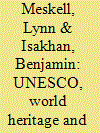

|
|
|
|
|
| Summary/Abstract |
Since March 2015, the Saudi-led military intervention in Yemen has had devastating consequences for the country, its people and its rich cultural heritage. This article traces the responses of the world’s foremost multilateral body concerned with heritage promotion and protection, the United Nations Educational, Scientific and Cultural Organization (UNESCO). Drawing on extensive interviews, archival research and long-term ethnographic research on UNESCO itself and, more specifically, its responses to the war in Yemen, it documents UNESCO’s profound failures in protecting Yemen’s heritage and in confronting the Saudi-led coalition. To do so, the article utilises the framework of ‘gridlock’ to analyse how and why multilateral bodies such as UNESCO become hamstrung in confronting powerful member states in conflict. The article concludes by arguing that UNESCO’s failures in Yemen hold powerful lessons about the role of multilateral institutions in addressing conflict.
|
|
|
|
|
|
|
|
|
|
|
|
|
|
|
|
|
|
|
|
|